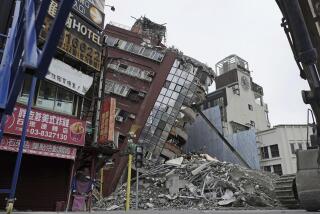A frantic search for quake survivors in remote China
- Share via
Reporting from Beijing — Chinese authorities raced against time, distance, altitude and wind in a remote corner of the Tibetan plateau as they tried to rescue victims of a magnitude 7.1 earthquake that killed at least 617 people and injured 9,110 others.
As dawn broke Thursday over Yushu county in western China, members of the military worked with residents and crimson-clad Buddhist monks using shovels, pickaxes and wooden planks to dig away at the wreckage. In television coverage from the scene, there was little evidence of machinery or bulldozers. More than 300 people were missing after the quake.
“What we need most are teams with special skills for earthquake rescue, because we’re mostly digging ourselves right now,” Pubu Cairen, head of the county’s emergency response, told state-run CCTV in a telephone interview.
Reining in the emotion in his voice, he told the TV reporter: “When I went back home to check, I found my house too had collapsed and my mother was killed.”
In a dramatic televised rescue in the predawn hours, workers holding flashlights with their teeth used their hands to haul away debris covering a girl who appeared to be about 12 years old.
“Hold on, little girl. Do you want a drink of water?” one man called out to her.
“I cannot move my feet and hands,” she answered in a tiny voice, then added: “Thank you, thanks, I’m so sorry to disturb you.”
At last laid out on a stretcher, the girl anxiously tugged on her sweater to cover a bared midriff. “Wait, I have to pull on my clothes,” she cried as she was pulled out and a crowd cheered.
The earthquake struck Wednesday morning in one of the most inaccessible reaches of China, in Qinghai province. The 100,000 people in Yushu county are mostly Tibetan, many of them making their living herding yaks and sheep.
Traditional houses made of wooden beams and mud crumpled almost immediately when the temblor struck at 7:49 a.m. near the county seat, Jiegu.
Newer concrete buildings, schools, the main hospital and a pagoda in a park collapsed or were heavily damaged in Jiegu. After a series of aftershocks rocked the landscape, more than 80% of the town’s buildings were left uninhabitable.
“The people in this area are incredibly poor. Most of them are herders or farmers. The housing is very flimsy, just mud and stone. I can understand why it collapsed,” said Susan Erdmann, a board member of Seva Canada, a charity that sets up eye clinics.
Erdmann has worked in the hospital that collapsed. “It is the only real hospital in the area,” she said. “People used to walk for a day to get there. Even before this happened, their needs were tremendous.”
Many schools collapsed as well, evoking painful memories of the Sichuan province quake of 2008 in which, by the official count, 5,335 children were crushed to death in their classrooms.
“Buildings in our school were all toppled, and five pupils have died,” said a teacher named Chang at the Yushu Primary School, a boarding school with about 1,000 students.
“Morning sessions did not begin when the quake happened,” Chang told the official New China News Agency. “Some pupils ran out of dorms alive, and those who had not escaped in time were buried.”
Troops sought to free 20 teachers and students buried at a vocational school.
Logistical difficulties frustrated rescue crews. Phone lines and electricity were out, and strong winds swept the plateau.
Nearly 12,000 feet in elevation, Yushu is a day’s drive from the nearest big airport in the provincial capital, Xining. A small airport nearby that opened last summer lacks fuel pumps and lost power and communications equipment in the quake.
Dust storms swirled along the steep mountain road leading to Yushu, impeding rescue crews coming to help. Convoys of army trucks, ambulances, volunteers and families heading out to look for missing relatives moved at a crawl past yak herds down a two-lane road that winds through hills dotted by Tibetan prayer flags.
During the first night after the earthquake, many of the Tibetans fled the town and took shelter in tents in the mountains, returning to a nomadic lifestyle they’d given up years before.
“People are sleeping in the mountains. They don’t want to go back to their houses, which are made of mud,” said a 24-year-old student from Yushu, reached by telephone in Xining.
The student, who did not wish her name to be used, said most of the victims were Tibetans, many of them older people who were sleeping or otherwise at home when the earthquake hit.
“It was a very destructive earthquake,” the student said. “We have never had such a strong one in Yushu.”
People’s Liberation Army troops garrisoned in Yushu secured banks, oil depots and caches of weapons and explosives shortly after the quake, CCTV reported, but there were no reports of looting or ethnic tension.
Early indications were that Tibetans and Han Chinese were working well together in the rescue effort.
As with the Sichuan earthquake, the Chinese military will probably take a major role in the rescue work. The military had ordered 1,500 airborne troops and 100 parachutists to assist in the quake zone.
barbara.demick @latimes.com
Tommy Yang of The Times’ Beijing Bureau and special correspondent Wangmo Golok in Xining contributed to this report.
More to Read
Sign up for Essential California
The most important California stories and recommendations in your inbox every morning.
You may occasionally receive promotional content from the Los Angeles Times.










